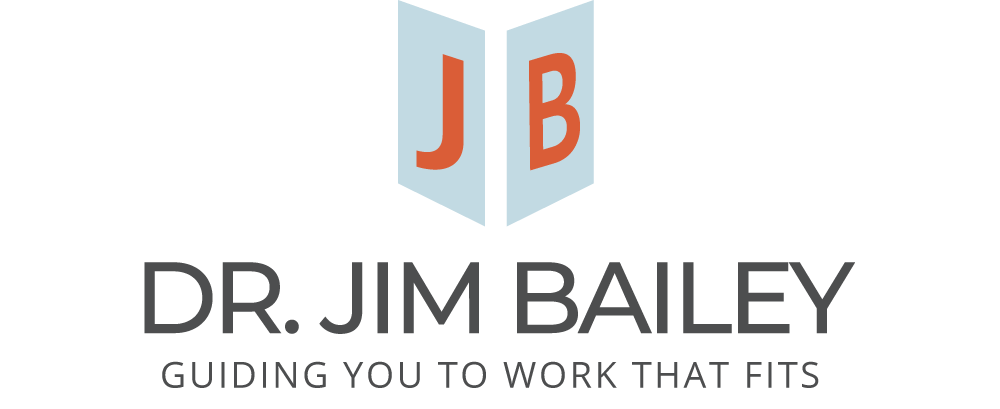Your Work is More than a Job
Way back when I first started doing this thing that I call Career Coaching I was blessed to work with my friend John. He was approaching thirty and had left a ministry position to return to Knoxville with his wife to raise their young family. As we had our first conversation he said: “Jim, I need your help picking a good job, something that will pay enough money to provide for my family’s needs. Just a job, nothing more. Maybe something in pharmaceutical sales.” I responded, “John, there’s no such thing as ‘just a job’”.
All of us work. If we’re lucky we get paid well to do that work but there are many important kinds of work (like parenting and parent-care) where there is no pay at all. For most of us our work will be the one thing, except for sleep, that consumes most of our focused time on the planet. We often have conflicting feelings about our work.
In recent years there’s been a quiet revolt against work, especially among those in their twenties and thirties, because some see work only as an evil or drudgery that’s required to have the necessary money to live and play. You see it in subtle signs, like the growing appeal of systems (government, unions, etc.) to ensure we get what used to be provided by working more or harder. In some ways I understand this, the dollars I earn don’t buy as much as the dollars my father earned, but I think it’s a symptom of a larger problem - We’ve lost a higher sense of meaning in our work.
Our work was never meant to be only a way to provide for ourselves, nor was it meant to be a form of self-expression. That’s why I avoid using the term “Occupation” - work shouldn’t just occupy your time - and I advise my friends to view their work as ways they apply who they are, and not the definition of who they are. Our work was meant to be a way we bring something good to the world.
Many times I’ve had “empty nest” clients who spent decades dedicated to the raising and care of their children who then said to me, “All I’ve done the majority of my adult life is be a mom or a housewife.” I’m simultaneously concerned and almost amused by this because I fully recognize what it takes to raise kids and run a home well. (I often have these lovely people make a list of everything involved in doing that job, just so they can see how many “jobs” they’re doing within that role.)
Even the least esteemed jobs have potential to benefit the world. As Dr. Martin Luther King said, “Whatever your life’s work is, do it well… If it falls to your lot to be a street sweeper… sweep streets so well that all the host of Heaven and earth will have to pause and say, “Here lived a great street sweeper, who swept his job well.” We’ve lost that sense of higher purpose in our work.
Pastor Tony Evans said, “To live without a sense of divine appointment is to simply exist, to be detached from an eternal perspective (of your work) and, therefore, simply marking time.” This doesn’t mean each of us is supposed to “go into ministry”, but it does mean each of us has potential to minister - to bring good, to make a difference, to see higher purpose achieved - through our work. Seeing an “eternal perspective” or higher purpose in our work transforms it from Occupation - just marking time - into Vocation - a Calling.
You don’t have to experience a burning bush, a vision in the desert, or a lightning strike to gain insight into your Calling. Evidence of your calling can sometimes be right in front (or within) you. For example, your innate gifts and strengths (if you know them) are easy indicators of the kinds of work you’re naturally inclined (and designed) to do. Because human intelligence is very flexible and we can make ourselves do work for which we were not designed this can be tricky, but there are ways to distill what types of work tasks and roles naturally fit you.
Then there are the affections of your heart. Now before some of you logical, “just get it done” types dismiss this as silly emotional stuff, stop to consider the things to which you’re naturally attracted. Sure, it may be toward helping certain kinds of people, but it may also be solving certain types of problems or creating or building certain kinds of things. It may be a stretch (or even laughable) for you to consider that maybe there is something Divine about the things that make you feel “I could do this all day long” or “I was made for this”, but those are often the feelings that turn occupation into vocation.
We were made to have a higher sense of purpose in our work. It’s my hope that you find yours.

